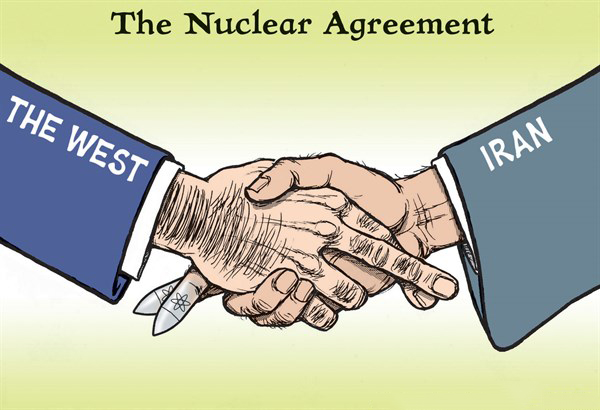HARI SREENIVASAN: While many U.S. sanctions imposed on Iran have been lifted, others remain in effect.
Just today, the Treasury Department announced new sanctions on 11 foreign companies or individuals for supplying parts for Iran's ballistic missile program.
Joining me from Washington to discuss the economic impact of the Iran deal is Bloomberg News White House correspondent Angela Greiling Keane.
So, what are we to make sense of this? Yesterday, we saw Secretary of State Kerry saying and the E.U. saying sanctions have been lifted. Today, we're talking about new sanctions still imposed on them.
ANGELA GREILING KEANE, Bloomberg News: Well, both have the benefit of being true.
What happened yesterday was, when the nuclear deal reached its implementation day, the U.S. and the other parties to that agreement lifted the sanction that they had imposed because of the Iranian nuclear program. So, those, effective yesterday, are off.
However, today, not unrelated to the timing of yesterday, the U.S. Treasury imposed new sanctions on 11 Iranian businesses and people, people that do business with Iran. And the reason for those new sanctions is because of Iran's ballistic missile program.
Since 2010, the U.N. Security Council has required that Iran not develop or test ballistic missiles that could be used to launch nuclear weapons. But, of course, those tests have continued as recently as last month.

HARI SREENIVASAN: So, to clarify, for businesses in the United States, what happens? This isn't like the opening or normalizing of relations with Cuba.
ANGELA GREILING KEANE: Right.
President Obama, in fact, used the analogy when he spoke today in the Cabinet Room of the White House, he said, this is very different than Cuba, because, while the U.S. does now have official diplomatic relations with Cuba, it doesn't with Iran.
For U.S. businesses, there is still a lot of caution and limitations. Really, the one sector that benefits most for the U.S. is aviation, because the nuclear deal that was reached last summer, it included a carve-out for airplane production and airplane leasing and parts to service that industry.
But other industries, particularly financial services, are still extremely limited and have reason to be very, very cautious when they proceed with Iran because of the sanctions, such as we saw from this morning, that are still in place.
HARI SREENIVASAN: What about the optics of it, in that sense that — for example, Iran says that they are going to buy a bunch of planes, but they are going to buy it from Airbus, right?
ANGELA GREILING KEANE: Right.
HARI SREENIVASAN: So, is Boeing kind of at a disadvantage that they couldn't sell nearly as fast? But, at the same time, we have got a presidential race that is happening.
ANGELA GREILING KEANE: Exactly.
There is a lot of question marks still. Airbus did announce their deal with Tehran yesterday, and Boeing, even though it has a green light, still has to go through some hoops. They need a license to be able to sell to Iran.
So, there's still plenty of opportunity for Boeing. Iran has great plane demand. The average age of their planes is 27 years old for Iran Air. So, there is more opportunity for aviation. But there are risks, in part because of optics. It's — Iran is indeed not a friend of the U.S.
And the Obama administration has made very clear that there are serious concerns about human rights, relations with Israel and other allies of the U.S. in the Middle East. And companies that want to do business with Iran do have that concern. How good does it look to be cozying up with Iran?
And then there is a question mark of what happens if a Republican is elected to succeed Obama. Will the deal still be in place? Will the agreement stand? Hillary Clinton, the leading Democratic candidate, of course, was President Obama's secretary of state, so, if she is to win the presidential election, there is little doubt that the agreement would stay in place, because she helped negotiate the early stages of it.
HARI SREENIVASAN: Now, Iran also said that they were going to start production and, I guess, I should say, selling about 500,000 barrels of oil.
Right now, the U.S. has very, very low oil prices. Does that mean, — basic economics, they increase supply, decrease demand, does that mean that the prices fall further, or is it a real drop in the bucket when you think of global oil?
ANGELA GREILING KEANE: No, Iran is a major oil producer.
They used to be the second largest producer in OPEC. So, the effects of the Iranian production on the world oil markets could be large. And, for Iran, while it's a great opportunity to be able to earn more money and produce more, it really couldn't come at a worse time.
The worldwide price of a barrel of oil fell below $30 at the close on Friday. And, you know, a few years ago, we were looking at $100 barrels of oil, to put that in perspective. So, if Iran is to increase production, and therefore increase supply worldwide, basic economics tells you that that will serve likely to depress prices further.
HARI SREENIVASAN: All right, Angela Greiling Keane of Bloomberg, thanks so much for joining us.
ANGELA GREILING KEANE: Thank you.











